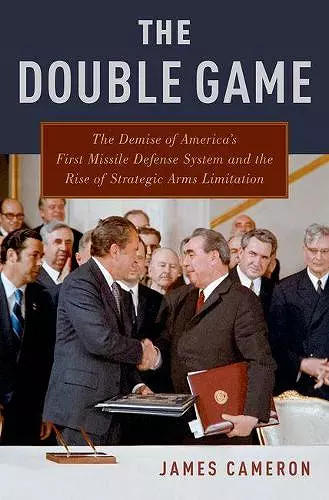The Double Game
The Demise of America's First Missile Defense System and the Rise of Strategic Arms Limitation
Format:Hardback
Publisher:Oxford University Press Inc
Published:7th Dec '17
Currently unavailable, and unfortunately no date known when it will be back

How did the United States move from position of nuclear superiority over the Soviet Union at the beginning of the 1960s to a period of arms control based on nuclear parity the doctrine of mutual assured destruction in 1972? Drawing on declassified records of conversations between three presidents and their most trusted advisors, this book provides a new and fascinating answer to this question. John F. Kennedy, Lyndon Johnson, and Richard Nixon struggled to reconcile their own personal convictions on the nuclear arms race with the very different views of the public and Congress. In doing so they engaged in a double game, hiding their true beliefs behind a façade of strategic language while grappling in private with the complex realities of the nuclear age. The book shows how Kennedy and Johnson consistently worried about the domestic political costs of their actions, pushing ahead with an anti-ballistic missile (ABM) system for the United States for fear of the domestic political consequences of scrapping both the system and the doctrine of strategic superiority on which it was based. By contrast, the abrupt change in U.S. public and congressional opinion in 1969 forced Nixon to give up America's first ABM and the U.S. lead in offensive ballistic missiles through agreements with the Soviet Union, despite his conviction that the U.S. needed a nuclear edge over the USSR to maintain the security of the West. By placing this dynamic at the center of the story, the book provides a completely new overarching interpretation of this pivotal period in the development of U.S. nuclear policy.
For some 50 years, Washington and Moscow have been involved in a bilateral process of arms limitation and reduction that appears to be coming to an end... It is natural to return to the beginning of this process to try to understand how this system of restraints emerged. As James Cameron argues in The Double Game, we've been wrong about what motivated strategic arms limitation all along. * Jeffrey Lewis, Survival *
[P]rovides an extremely well-documented analysis of the evolution of US policy regarding strategic missile defense within the context of overall nuclear arms policy from the Kennedy through the Nixon administrations... Recommended * CHOICE *
This book is equally balanced between an analysis of nuclear weapons buildup, BMD, and strategic calculation in relation to domestic and bureaucratic politics. Its relevance is clear today as a revisionist Russia physically reasserts itself in eastern Europe, China's influence gains momentum, and North Korea and Iran strive for nuclear weapon latency. This book is timely and important for policymakers, political scientists, historians, and analysts of policy. * Rusty Allison, H-War *
ISBN: 9780190459925
Dimensions: 155mm x 239mm x 23mm
Weight: 499g
248 pages